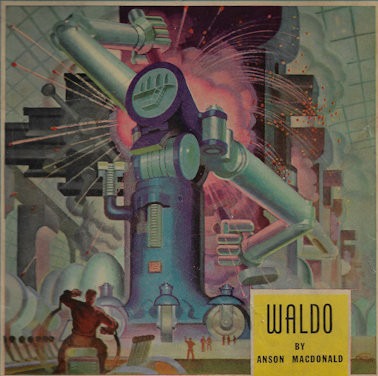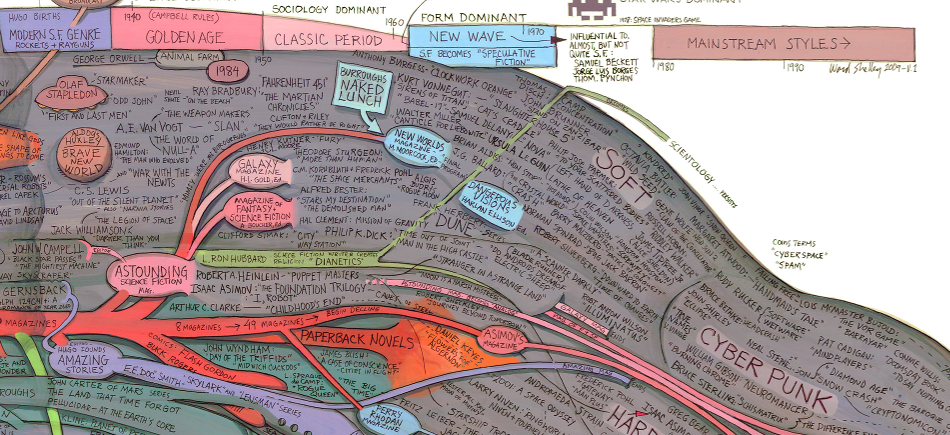The other day I read a post (not naming names because this is not directed at that post. It was merely the catalyst) that was discussing the general length of “successful” science fiction, coming down on the side of the novella as the “ideal” length.
Although examing literature by its length is, I think, completely wrong-headed, that’s not the aspect that I wanted to explore.
The article mentioned length, it mentioned characterization. It mentioned story arcs, offering enough space for character cycles, resolving conflicts.
But NOWHERE did it mention anything related to why the genre is called SCIENCE Fiction. Not one thought was given to the necessity of giving enough space for the author to describe, develop, explore and examine the implications of the new scientific principles or new scientific capabilities presented by new, novel and unique technologies (that affects the characters in some way…kinda the raison d’etre of the genre, right?)
I was left to ponder the following question:
Has this genre evolved so far from its roots that the science and technology element has become so debased that it is no longer considered a major element of the genre? It used to be THE driving force of this genre.
I can’t really wrap my head around the concept of no-science Science Fiction. That would be akin to writing a horror story in which the opening chapter explained that no one was harmed during the course of the events that followed and, really, it turned out that all of the occultic, paraabbienormal stuff was utter bullcrap – the characters experiencing these things had been given LSD without their knowledge, or writing a fantasy story in which magic was debunked on the first page, all the non-human characters disappeared as a result and the reader is left wondering how in the hell Red couldn’t tell her grandmother was a wolf.
Madness.
Here’s the genre’s very first definition (we go here because without a definition, no one can say this IS, this IS NOT Science Fiction. All you can legitimately say is “It’s fiction”:
“A charming romance intermingled with scientific fact and prophetic vision…” -Hugo Gernsback, March 10, 1926
“A piece of scientific fiction is a narrative of an imaginary invention or discovery in the natural sciences and consequent adventures and experiences… It must be a scientific discovery—something that the author at least rationalizes as possible to science.” J.O. Bailey (Pilgrims Through Space and Time, 1947)
“A science fiction story is a story built around human beings, with a human problem, and a human solution, which would not have happened at all without its scientific content.” Ted Sturgeon, 1952
“Science fiction is that class of prose narrative treating of a situation that could not arise in the world we know, but which is hypothesized on the basis of some innovation in science or technology, or pseudo-science or pseudo-technology, whether human or extra-terrestrial in origin.” Kingsley Amis 1960
“Science fiction can be defined as that branch of literature which deals with the reaction of human beings to changes in science and technology.” Isaac Asimov 1975
I could go on and on. But I assume you’ve noticed the single thread that weaves through all of those definitions. I’ve highlighted it above so there’s no need to guess.
Re-read those definitions while removing that word (and its partner “technology”). You’ll find that the definitions no longer make any sense.
And to be blunt about it, we didn’t settle on “Person Fiction” or “Emotional Fiction” or “Interpersonal Relationships Fiction”. Amazing Stories is an SF magazine, not a CF magazine (Character Fiction).
Sure, character has a place, but, in the definitions above, the inclusion of people is not always a requirement.
There’s at least one Hugo-winning novel that supports that statement – Dr. Isaac Asimov’s The God’s Themselves.
There’s another, though it be only quasi or proto science fiction – Abbott’s Flatland.
In both stories, non-human characters, much different from ourselves, carry the narrative.
Now I’ll admit that I am not personally enamoured of the shift the genre has experienced from the late 80s on. That shift has seen the genre’s focus move primarily from centering the BDO (Big Dumb Object…code for the science or technology or discovery that sets everything in motion and is, in many cases the “antagonist” to character’s protagonists) to centering characters.
My general, emotional reaction to that shift has been “I’ve never been into soap operas and I’m not into them now.” (Probably the very reason that I had no engagement with Game of Thrones.)
As an historical side note, that shift has also seen the so-called new wave and its ally “literary fiction” (including its attendant snooty academics and critics) finally triumph over “genre” in the decades long battle between them. It used to be that the science fiction genre reveled in its literary transgressions, but it’s finally been swamped by the need to make more money – and FAR more people read about other people (though “why” continues to mystify me**) than they do about “egg-heady” things. It was seemingly inevitable that for the genre to remain economically viable for publishers, the nature of the genre had to change.
I’ve also argued, vainly (even though I’m correct on the merits) that the pre-marketing-dominance era (the time when writing science fiction was an “art”, not the production of a “commodity”) “lack of characterization”, use of “stock or cardboard characters” was NOT (at least not always) owing to “bad writing” but was in fact a primary feature of the genre during that era. Stories were generally of short length (quick reads) and in order to have wordage space for the science stuff, something else had to go.
I’ve also argued that this use of character tropes (hero, mad scientist, femme fatale, sage, etc) was very effective at allowing the reader to identify with the character(s) because there are so few details that could derail such things (I could be that scientist if I’d gotten a science education, whereas I’d never be that character who experienced all those things in detail during their childhood that informed their terribly complicated adult characterization because those things never came close to happening to me in my childhood), which is a part of the whole current era’s need to display everything and leave nothing to the reader’s own imagination. When the character lacks detail, it’s left to the reader to fill it in, in their own unique and custom way. I call this the “carpet” problem and characterize much of the so-called “literary fiction” genre as suffering from its use: it isn’t enough to inform us that the room the characters are in is carpeted. We need to have the author explain to us the color in excruciating detail, how thick the nap is, the feel of fibers, the faintly chemical smell left over from a recent cleaning, the complete origin and history of the pet stains that not even oxy can remove….that’s all well and good, but now I, as the reader, have been robbed of the opportunity to decide what that carpet is like for myself.
Fiction used to be a dialogue between the mind of the author and the mind of the reader. For that dialogue to occur and achieve fruition, some room must be left for BOTH participants, otherwise, its merely a lecture.
You see this far more in film than elsewhere these days, but it is creepingly pernicious. Film and television HAD to rely on viewer’s imagination because the technologies to display what was in the story simply did not exist, but in doing so, it included the reader/viewer in the story in ways that are no longer accessible in an era in which anything that one person imagines can be brought into visual reality.
For the genre that relies on speculation, extrapolation and imagination, this is not necessarily a good thing.
But I have moved far afield from original intent here. To get back to the original question – has the genre shifted so much that the “science” thing is no longer a necessary thing?
Well, I think it is certainly heading in that direction.
It’s also probably inevitable because, again, the need to appeal to the widest possible audience has become the paramount driving force, and we all know that the number of people capable of wrapping their heads around physics and chemistry and math and biology and geology and all of the other ologies, and LIKING to read about that stuff pales in comparison to the number of people for whom “what’s 2+2?” remains an open question.
Campbell (now debased) did speculate that maybe reading science fiction required a special kind of reader. Maybe that group of readers is largely drawn from the neuro-diverse community (many of whom have difficulties with “human” things like understanding the nuances of interpersonal stuff, the very thing that much “characterization” is based on), and so long as the market was small enough to sustain a place for the “science fiction” that appealed to the neuro-divergent, everything was hunky dory (generally speaking). But now the genre may be abandoning that minority community as it strives to appeal to an audience that does get and relate to those kinds of things (though I will admit that I would much rather be dealing with a life-threatening spaceship disaster with a crew of neuro-divergents than a bunch of neuro-typicals.)
I don’t have a “solution”; people are free to read and like what they want to and the marketers are free to bend our wills to whatever makes them the most money, and I am certainly free to protest it all, just as I am free to recognize that my protests will have absolutely no impact, other than perhaps prompting some to tell me that I am wrong.
What I do think is that the genre has changed mightily in the half-century plus that I’ve been engaging with it and most of that change does not appeal to me, personally. It’s not that there’s anything inherently bad or wrong with those changes: someone who writes a book that gets published under a heading of “Science Fiction”, one that is well received by its audience, has done what they are supposed to do – creating something appealing to their audience. They are not in the business of “maintaining the integrity of the genre”. Some few are in the business of creating literary artworks, while the vast majority are producing a commodity, no different than manufacturing BIC pens or harvesting cabbages. Neither will achieve success by flouting the demands of the marketplace.
But they also can’t make ME accept this new stuff as “Science Fiction”, despite the labeling. If it doesn’t include “…scientific fact and prophetic vision…” as a PRIMARY focus, it’s not meeting the definition for that genre.
It may be that what we’re really seeing is the slow morphing of what is “published” under the SF label…and THAT may very well be due to younger staffs at publishing houses never having really understood what the definition was, and how it’s a bit more of a hard-edged definition than are most genre definitions, owing to the invocation of that word “science”. Science itself is not a wholly permeable membrane and neither is it’s genre.
What we may be witnessing is the breakdown of the distinction between “science fiction” and “fantasy”, even though there remains (or at least ought to remain) a distinct difference, one that Rod Serling clearly articulated “It’s been said that science fiction and fantasy are two different things. Science fiction—the improbable made possible. Fantasy—the impossible made probable.”
Science Fiction has been and is supposed to be rooted in reality*. It’s very premise is that some things can affect, can change, the REALITY we inhabit and we should explore and examine those possible changes for our own future benefit, in addition to the entertainment value. And while it is true that at this point many readers will be silently mumbling Clarke’s dictum about sufficiently advanced technologies appearing to be magical, is is important and informative to remember that Arthur did not say “sufficiently advanced technologies ARE magical”, he said “appear to be”, invoking the observational requirements of the scientific principal itself. That statement was not meant to suggest parity between technologies (science) and magic, it was meant to point out that DESPITE appearances, there remains a fundamental difference between the two.
I’ve got no axe to grind against Fantasy (the genre; when it impacts the real world, I do have MANY axes to grind. One example for clarification: the definition of fetal electrical activity as a “heartbeat” so that misguided individuals can deny women bodily autonomy. No scientific or reality-based support for that definition, but the courts are accepting it. THAT is “fantasy” causing harm). I’m mildly miffed that it has supplanted Science Fiction in popularity, but largely understand that. Most potential readers can accept magical spells but don’t see the appeal of E=MC squared for story material.
In some ways, these changes in the genre are reflective of our society as a whole. It’s a society that is largely turning away from scientific rationality, a society that is witnessing the very death of the concept of an objective reality, a world in which the statement “I reject your reality and substitute my own” is a real thing, and almost a viable statement…not because people have suddenly acquired the magical ability to alter reality, but because we are now able to insulate ourselves so effectively from the real world that “reality” no longer matters.
A case in point directly impacting this genre is the fairly recent rejection of the idea that science fiction is extrapolative and predictive of the future but is, instead, commentary on our own times.
First, well duh. It always has been commentary on our times. Ever since the first cave person grunted meaningfully at another cave person, every utterance has been “commentary on our times”. This is the equivalent of saying that books aren’t about words printed on a page, they’re about letters strung together and then printed on a page.
Second – look at those definitions again. Extrapolation features in many of them. Leading practitioners of the art publicly stated that prediction was what they were doing (while openly admitting that it was a fools errand) (and I can show you the videos). Bradbury, who didn’t really write Science Fiction, stated that the genre was useful for informing us of what we should be worried about in the future – like book banning. No, Firemen don’t go around torching housewives for hiding a few books in the ceiling, but, so far as book banning itself is concerned, we obviously did not heed that warning.
Science Fiction PREDICTS so that it CAN comment on our contemporary society. Sometimes it even time travels to do so.
So much of this seems to be newer generations attempting to place their own imprint on a going thing. This is not inherently a bad thing either. In fact, it is inevitable. Yet so many of them seem to believe that what has gone before must be weakened, diminished, destroyed or eliminated before the stink is sufficiently diluted so we can smell their pee.
And its not even a peeing contest. If anything, it’s supposed to be a cooperative venture – everyone peeing on the SAME tree so that it smells like ALL OF US.
Do yourselves a favor. Remember that you’re standing on the shoulder’s of giants (ALL the way down). Remember that you do not have to destroy in order to create. And remember that in the not too distant future, you’ll be looking back and wondering where all of the things that you truly cared about have gone.
*I don’t say this because it’s what I believe the genre should be. I write this because that’s what the definition – virtually every definition – of the genre states is a primary feature of the genre. You can’t extrapolate from the unknown. You have to start in reality.
**Since time immemorial, or at least since I’ve been old enough to remember watching TV, I have never understood the desire to witness fake interpersonal relationships that primarily focus on emotion. There’s more than enough interpersonal drama in everyone’s life, I don’t need to add fake ones. This, I know, runs contrary to mainstream thought, but then again, whenever the crowd is running in a particular direction, I turn in the opposite one to figure out why they’re running. May get me killed one day, but I think getting squished by Godzilla’s foot is a pretty honorable way to go.










